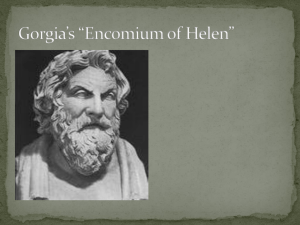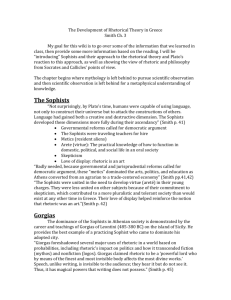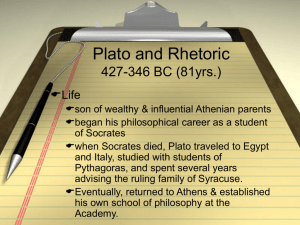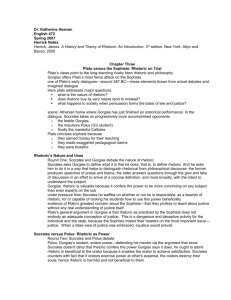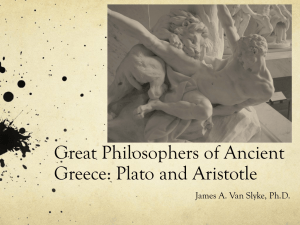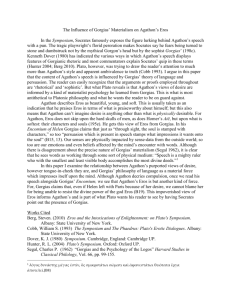Plato on Rhetoric
advertisement
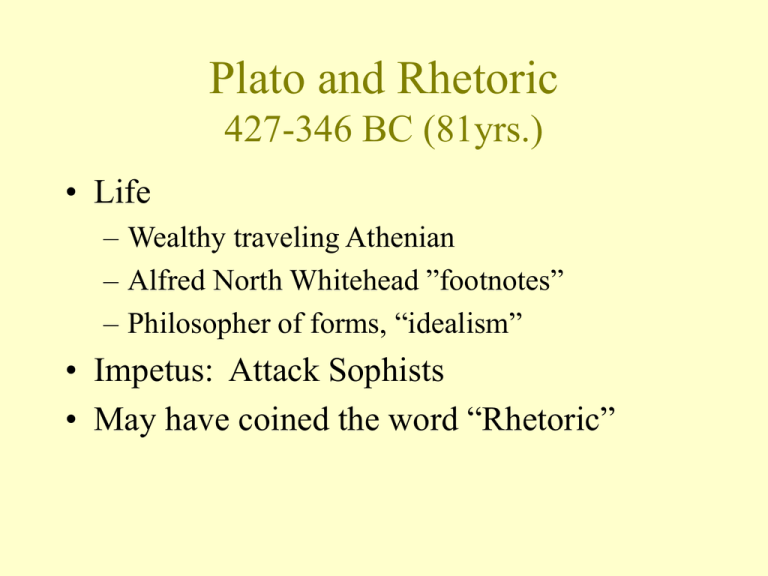
Plato and Rhetoric 427-346 BC (81yrs.) • Life – Wealthy traveling Athenian – Alfred North Whitehead ”footnotes” – Philosopher of forms, “idealism” • Impetus: Attack Sophists • May have coined the word “Rhetoric” Plato • Perfect Form Plato Close-up Plato on Rhetoric • Three works on Rhetoric: -The Apology -The Gorgias -The Phaedrus The Apology (399 BC) • After the fact version of Socrates’ trial • Socrates is charged with – Atheism – Corruption of youth • Believes truth is – self evident and personal – refuses to use ad hominem argument and appeals to pathos as the sophists do – Kennedy (pp. 44-45) Click here for pages. Socrates • Truth Socrates • The Hemlock The Gorgias (385 BC) • Early work • Major ideas implied or stated – Dialectic nature of truth “remembered” in dialogue among experts – Rhetoric is pre-selected communication in order to defend opinions The Gorgias Attacking Rhetoric • Three rounds of speeches – First Gorgias and Socrates – Second Polus and Socrates – Third Challicles and Socrates The Gorgias Continued • Topics – What is the nature of rhetoric? – Does rhetoric by its very nature tend to mislead? – What happens to a society when persuasion is a basis for law and justice? (Herrick, p. 54) • Theme – The basis of justice – Doxa (mere public opinion) vs Episteme (true knowledge) Socrates/Plato and Gorgias Round One • Socrates/Plato: What is the art or techne (knowledge) rhetoric offers? (a question) • Gorgias: Rhetoric is concerned with words, persuasive words. • Socrates/Plato: Not a definition, because all disciplines use persuasion. • Episteme (true knowledge) vs pistis (mere opinion. Socrates/Plato and Gorgias Round One Continued • Justice involves episteme. Justice is a lofty, time consuming topic. Public is ignorant. – The rhetorician, then, is not a teacher of law courts and other public gatherings as to what is right or wrong, but merely a creator of beliefs; for evidently he could never instruct so large a gathering in so short a time (445) (Herrick, p. 56). Socrates/Plato and Polus Round Two • Socrates vs Polus (the colt) • Polus: “Rhetoric is the greatest power in the country.” • Plato: Comparisons – The arts vs sham arts Socrates/Plato and Polus Round Two: True and Sham Arts • The Arts of Health • Body – Maintain: gymnastics – Restore: medicine • The Sham Arts of Health • – Maintain: – Restore: Soul legislation justice Body Soul make-up cookery sophistic rhetoric Socrates/Plato and Callicles Round Three • Callicles: Natural Justice or the rule of the intelligent over the baser. • Machiavellian • A wann’a be? A Yuppie? A Republican? (the ladder of success--”pull it up after you”) Reflections on the Gorgias • Rhetoric merely a means to justice: A Representational Model of Communication • Plato rejects sophists arguments and uses them: probabilities, ridicule (Albert Einstein) • Revenge on Callicles • Rejection of transient notion of truth (time, justice and juries) The Phaedrus (367 BC) • • • • Twenty years after the Gorgias An older, mellower Plato Gorgias “anger,” Phaedras “love” Gorgias “in the name of morality reject rhetoric”Romilly, p. 71 The Phaedrus (continued) • Content: A conversation with a young sophist student • Intellectually and physically attractive • Love: “divine madness” a “trance entered by poets” • The Soul has three parts The Phaedrus and the Soul • The three parts (Charioteer) • 1. Loves wisdom 2. Loves nobility and honor 3. Loves appetite or lusts • Richard Weaver--Rhetoric as: – Rape, Seduction, or Love The Phaedrus and Rhetoric • • • • Rhetoric therefore is the art of influencing souls Psychagogia “leading souls” Know “the truth” first, then Adapting to audience’s soul is the art of rhetoric-soul of love, soul of honor, soul of lust • Is “soul talk” the same as “understanding” or “meeting of meaning?” • Justice is realized when the lower submits to lover of wisdom. (Micah 6:8—justly, love mercy, walk humbly) The Phaedrus (Comments/Criticisms) • The relationship of rhetoric to truth – discover? or propagate? (mere advocacy) • Create the truth? • Rhetoric and Dialectic both can produce evil • Listen for soul--Remembering? • Is this tradition or God? The Phaedrus (Comments/Criticisms) • Kennedy p. 58 “Plato’s is an impractical rhetoric, . . . How can we know everyone's soul? • Yet, we can know our soul “that which is most personal is also most general” • Plato starts with ontology or being, thus soul talk is remembering or recalling (reincarnation) • Comparing the Gorgias and the Phaedrus (overhead) • Are our minds like his? Alfred North Whitehead The Phaedrus (Comments/Criticisms) • • • • Do you believe in true love? Do you know Clinton is lying? Others? How can you know what you have never experienced? Remembering? • Comparing Gorgias to Phaedrus (click here) Two Language Realities • • • • Sophists Experiential The Words Clinton Plato Reflectionism Ideas Presidential
